Recently updated on December 18th, 2024 at 11:50 am
The Big Bang Theory: Understanding the Origin of the Universe
The Big Bang Theory is a fascinating and largely accepted account of how our universe began. It is more than a historical theory; it is a story that is still unfolding, providing insights into the secrets of reality. Let’s look at what the Big Bang Theory is, what it says about our universe, and why it matters.
What is the Big Bang Theory?
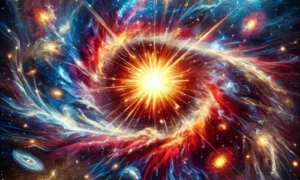
According to the Big Bang Theory, the universe began approximately 13.8 billion years ago as a singularity, which is a point of infinite density and temperature. From this small, heated state, the cosmos began to expand and cool, eventually giving rise to the galaxies, stars, planets, and life we witness today.
The Big Bang was not an explosion in space, but rather an expansion of space that created time, matter, and energy.
Key Stages of the Big Bang
- The Beginning (Planck Epoch): The universe was extremely hot and dense, with all natural forces—gravity, electromagnetism, and nuclear forces—united.
- Inflation (Rapid Expansion): The universe expanded faster than the speed of light in a fraction of a second.
- Formation of Matter: As the universe cooled, small particles called quarks and electrons began to unite, eventually producing atoms like hydrogen and helium.
- First Light: Around 380,000 years after the Big Bang, the cosmos cooled enough for light to flow freely, resulting in the Cosmic Microwave Background (CMB), a faint glow that we can still detect today.
- Formation of Stars and Galaxies: Gravity drew hydrogen and helium together into huge clouds, triggering nuclear fusion and producing the first stars. Over millions of years, these stars coalesced into galaxies.
Evidence Supporting the Big Bang Theory
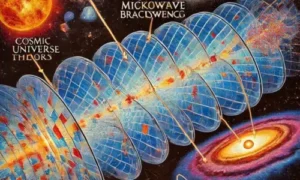
The Big Bang Theory isn’t just a random guess; it’s supported by compelling scientific evidence:
- Expanding Universe: In the 1920s, Edwin Hubble found that galaxies were moving away from us, demonstrating the universe’s expansion. This is entirely consistent with the Big Bang concept.
- Cosmic Microwave Background (CMB): Discovered in the 1960s, the CMB is the remaining heat from the Big Bang that has cooled to only 2.7 degrees above absolute zero.
- Light Elements: The theory precisely forecasts the amount of hydrogen, helium, and lithium present in the cosmos today.
Unanswered questions.
While the Big Bang Theory answers a lot, certain questions remain:
1. What caused the Big Bang?
Scientists are still discussing what caused the Big Bang. Was there a quantum fluctuation? A collision between universes? We do not know yet.
2. What happened before the Big Bang?
Time and space as we know them may have originated with the Big Bang, making “before” a difficult concept.
3. What Is the Definition of Dark Matter and Energy?
These mysterious chemicals make up the majority of the universe, yet their exact nature is unknown.
The Big Bang Theory is more than just a scientific explanation; it’s a profound story of how our universe came to be. It reveals that from a tiny, hot, and dense beginning, the universe has grown into the vast and complex cosmos we see today.
While much has been discovered, the Big Bang still leaves us with fascinating questions about the nature of time, space, and existence itself. As scientists continue to explore these mysteries, the story of the universe becomes richer, reminding us of the beauty and complexity of the cosmos.
Why Does the Big Bang Matter?
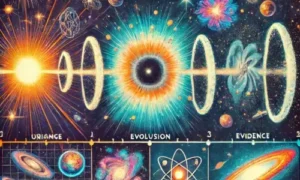
Understanding the Big Bang entails not just looking back in time, but also understanding the universe’s present and future. Studying the Big Bang allows scientists to:
- Learn how galaxies, stars, and planets formed.
- Predict the universe’s destiny, including whether it will expand indefinitely or collapse in a “Big Crunch.”
- Investigate the fundamental forces and particles that underpin reality.
Conclusion
The Big Bang Theory is more than a scientific explanation; it tells a deep story about how our universe came to be. It illustrates how the universe evolved from a tiny, hot, and dense beginning to the huge and complex cosmos we know today.
While much has been discovered, the Big Bang raises fascinating questions about the nature of time, space, and existence. As scientists continue investigating these riddles, the universe’s story grows more complete, reminding us of its beauty and complexity.
Understanding the Big Bang is more than just knowing our origins; it’s about igniting curiosity, instilling awe, and appreciating the interconnection of everything around us. The journey to uncover the mysteries of the cosmos is far from over, making it so intriguing.




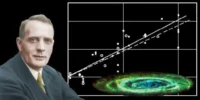

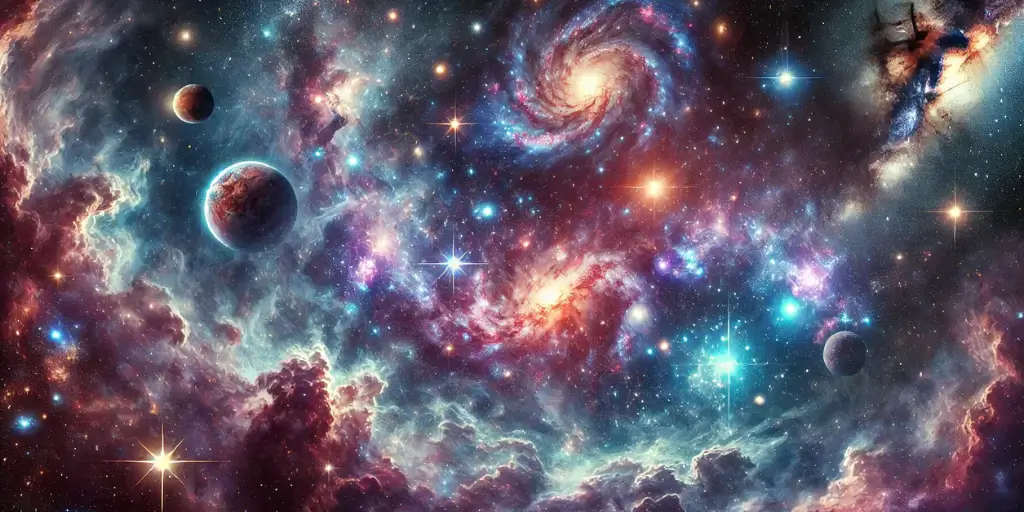
Norberto Balloon
November 28, 2024It’s onerous to search out knowledgeable people on this topic, but you sound like you know what you’re talking about! Thanks